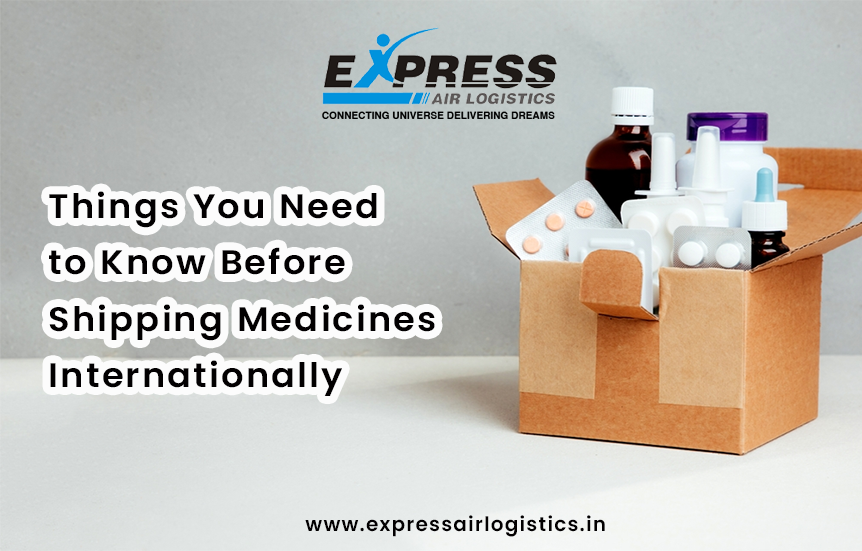
Shipping medicines internationally can be a complex process, but it’s an essential service for many individuals and businesses. Whether you’re sending prescription medications, over-the-counter drugs, or medical supplies to someone in need, understanding the regulations and logistics involved is critical to ensure safe and legal delivery. This blog highlights the key factors to consider before shipping medicines internationally, helping you navigate the process with confidence.
Understand Local and International Regulations
Before shipping any medication abroad, it's essential to familiarize yourself with both local and international regulations. Different countries have varying laws regarding the importation of medicines, and many nations have strict controls in place to prevent the distribution of unauthorized or counterfeit drugs. Ensure that the medication you plan to ship is allowed in the destination country and that you have all necessary documentation in place to comply with customs regulations.
Verify the Medication's Legal Status
Certain medications, especially prescription drugs or controlled substances, may be subject to additional scrutiny when shipping internationally. Some countries prohibit the importation of specific medications, while others may require special permits or licenses. It's essential to check whether the medicine you're shipping is legal in the destination country and if it requires any special documentation or approval to pass through customs.
Choose the Right Courier Service
Not all courier services are equipped to handle medical shipments, especially those that require temperature control or sensitive handling. When shipping medicines, it's crucial to select a courier service with experience in handling pharmaceuticals and medical supplies. Look for courier companies that offer specialized services for shipping medicines, such as temperature-controlled packaging and tracking to ensure safe delivery.
Temperature Control and Packaging
Some medicines, especially biological or temperature-sensitive medications like vaccines or insulin, require strict temperature control during shipping. Ensure that your courier service provides the appropriate packaging solutions, such as insulated boxes, cold packs, or refrigerated transport, to maintain the required temperature. Inadequate packaging can compromise the efficacy of the medication and potentially render it unsafe for use.
Proper Documentation and Prescription Records
When shipping medicines internationally, proper documentation is essential to ensure smooth customs clearance. This may include a copy of the prescription, a doctor’s note, or any necessary certificates to prove the legality and necessity of the medication. Ensure that you provide all relevant paperwork to avoid delays or confiscation of the shipment. Many countries also require specific labeling on pharmaceutical packages, so check local regulations to ensure compliance.
Packaging and Labelling Requirements
In addition to temperature control, there may be specific packaging and labeling requirements for shipping medicines internationally. Packaging should protect the contents from damage, contamination, or theft. Many countries also require that the packaging clearly displays the contents, dosage, and the sender’s details. Check the destination country’s regulations for any specific packaging or labeling rules that apply to medical shipments.
Customs Declarations and Duties
Medicines being shipped internationally must go through customs, and failing to comply with customs requirements can result in delays, fines, or even confiscation of the shipment. Be sure to complete all necessary customs declarations accurately, indicating the contents, value, and intended use of the medication. Some countries may impose duties or taxes on imported medications, so be prepared for potential fees or charges.
Consider the Shipping Timeframe
When shipping medicines internationally, it’s important to consider the delivery timeframe. Certain medications may have a limited shelf life or may need to be delivered urgently for medical reasons. Choose a shipping method that guarantees the fastest possible delivery and consider tracking services that will allow you to monitor the progress of your shipment. Plan ahead to ensure the medication arrives safely and on time.
Insurance for Peace of Mind
Shipping medicines internationally involves some risk, and while courier services take precautions to handle packages carefully, accidents can still happen. Consider purchasing insurance for your shipment to protect against loss, damage, or theft. Insurance can provide peace of mind, especially when shipping high-value or critical medications that are essential to the recipient’s health and well-being.
Shipping medicines internationally requires careful planning and knowledge of regulations, packaging, and delivery methods. By understanding the legal requirements, choosing the right courier service, and ensuring proper documentation, you can ensure the safe and timely arrival of medications to the destination. Always prioritize safety, reliability, and compliance when shipping medicines, as the well-being of the recipient depends on it.
